
The history of Israel covers an area of the Southern Levant also known as Canaan, Palestine or the Holy Land, which is the geographical location of the modern states of Israel and Palestine. From a prehistory as part of the critical Levantine corridor, which witnessed waves of early humans out of Africa, to the emergence of Natufian culture c. 10th millennium BCE, the region entered the Bronze Age c. 2,000 BCE with the development of Canaanite civilization, before being vassalized by Egypt in the Late Bronze Age. In the Iron Age, the kingdoms of Israel and Judah were established, entities that were central to the origins of the Jewish and Samaritan peoples as well as the Abrahamic faith tradition. This has given rise to Judaism, Samaritanism, Christianity, Islam, Druzism, Baha'ism, and a variety of other religious movements. Throughout the course of human history, the Land of Israel has seen many conflicts and come under the sway or control of various polities and, as a result, it has historically hosted a wide variety of ethnic groups.
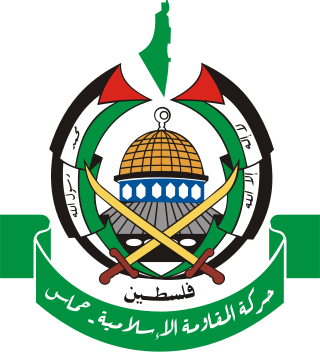
The Islamic Resistance Movement, abbreviated Hamas, is a Palestinian nationalist Sunni Islamist political organisation with a military wing called the Ezzedeen Al-Qassam Brigades. It has governed the Israeli-occupied Gaza Strip since 2007.

Palestinians are an Arab ethnonational group native to the region of Palestine.

Palestinian Christians are a religious community of the Palestinian people consisting of those who identify as Christians, including those who are cultural Christians in addition to those who actively adhere to Christianity. They are a religious minority within the State of Palestine and within Israel, as well as within the Palestinian diaspora. Applying the broader definition, which groups together individuals with full or partial Palestinian Christian ancestry, the term was applied to an estimated 500,000 people globally in the year 2000. As most Palestinians are Arabs, the overwhelming majority of Palestinian Christians also identify as Arab Christians.
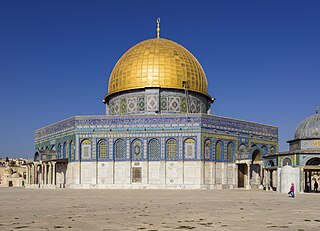
The history of the State of Palestine describes the creation and evolution of the State of Palestine in the West Bank and Gaza Strip. During the British mandate period, numerous plans of partition of Palestine were proposed but without the agreement of all parties. In 1947, the United Nations Partition Plan for Palestine was voted for. The leaders of the Jewish Agency for Palestine accepted parts of the plan, while Arab leaders refused it. This triggered the 1947–1949 Palestine war and led, in 1948, to the establishment of the state of Israel on a part of Mandate Palestine as the Mandate came to an end.

The occupied Palestinian territories, also referred to as the Occupied Palestinian Territory and the Palestinian territories, consist of the West Bank and the Gaza Strip—two regions of the former British Mandate for Palestine that have been occupied by Israel since the Six-Day War of 1967. These territories make up the State of Palestine, which was self-declared by the Palestine Liberation Organization in 1988 and is recognized by 146 out of 193 UN member states.

Palestine, officially the State of Palestine, is a country in the southern Levant region of West Asia recognized by 146 out of 193 UN member states. It encompasses the Israeli-occupied West Bank, including East Jerusalem, and the Gaza Strip, collectively known as the Occupied Palestinian territories, within the broader geographic and historical Palestine region. The country shares most of its borders with Israel, and it borders Jordan to the east and Egypt to the southwest. It has a total land area of 6,020 square kilometres (2,320 sq mi) while its population exceeds five million people. Its proclaimed capital is Jerusalem, while Ramallah serves as its administrative center. Gaza City was its largest city until 2023.

The one-state solution is a proposed approach to resolving the Israeli–Palestinian conflict, according to which one state would be established in former Mandatory Palestine. Proponents of this solution advocate a single state encompassing the currently recognized state of Israel, the West Bank and the Gaza Strip. The term one-state reality describes the belief that the current situation in Israel/Palestine is de facto a single state. The one-state solution is sometimes also called a bi-national state, owing to the hope that the state would be a homeland for both Jews and Palestinians.
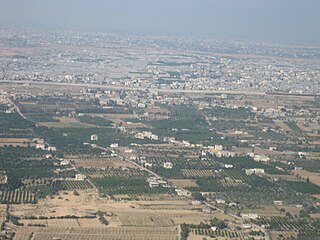
Rafah is a city in the southern Gaza Strip, Palestine. It is the capital of the Rafah Governorate of the State of Palestine, located 30 kilometers (19 mi) south-west of Gaza City. In 2017, Rafah had a population of 171,889. As a result of massive bombardment and ground assaults in Gaza City and Khan Yunis by Israel during the Israel–Hamas war, about 1.4 million Palestinians are believed to be sheltering in Rafah as of February 2024.
The Arab–Israeli conflict began in the 20th century, evolving from earlier Intercommunal violence in Mandatory Palestine. The conflict became a major international issue with the birth of Israel in 1948. The Arab–Israeli conflict has resulted in at least five major wars and a number of minor conflicts. It has also been the source of two major Palestinian uprisings (intifadas).

Ghada Karmi is a Palestinian-born academic, physician and author. She has written on Palestinian issues in newspapers and magazines, including The Guardian, The Nation and Journal of Palestine Studies.

The Arab–Israeli conflict is the phenomenon involving political tension, military conflicts, and other disputes between various Arab countries and Israel, which escalated during the 20th century. The roots of the Arab–Israeli conflict have been attributed to the support by Arab League member countries for the Palestinians, a fellow League member, in the ongoing Israeli–Palestinian conflict; this in turn has been attributed to the simultaneous rise of Zionism and Arab nationalism towards the end of the 19th century, though the two national movements had not clashed until the 1920s.

Iraq–Israel relations refer to the bilateral ties between the State of Israel and the Republic of Iraq. Due to Iraq's non-recognition of Israel as a legitimate state since the latter's establishment in 1948, the two countries have not had any formal diplomatic relations. The Hashemite Kingdom of Iraq was a part of the Arab coalition that declared war on and invaded Israel shortly after its establishment, sparking the First–Arab Israeli War, and the two states have since then been in a continuous state of hostilities. Iraqi forces also participated in the Third Arab–Israeli War and the Fourth Arab–Israeli War in 1967 and 1973, respectively.

Pakistan–Palestine relations refer to the bilateral relations between Islamic Republic of Pakistan and State of Palestine. The Palestinian Authority established an embassy in Islamabad on 31 January 2017. Pakistan remains a staunch supporter of the proposal for the creation of an independent Palestinian state, and in line with its pro-Palestinian doctrine, does not recognize the State of Israel. However, the former President of Pakistan, Pervez Musharraf, stated that Pakistan will recognize Israel's sovereignty if the latter withdraws its forces from the Israeli-occupied territories and allows an independent Palestinian state to be established within the Green Line that served as the international border between Israel and the Palestinian territories from the First Arab–Israeli War of 1948 to the Third Arab–Israeli War of 1967. Pakistan frequently provides various forms of humanitarian aid to the Palestinian Authority.
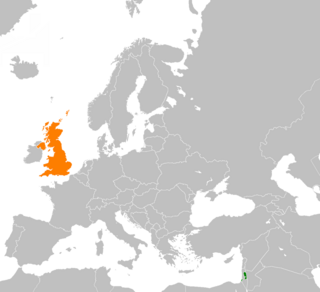
The United Kingdom does not recognise Palestine as a state. The UK has a non-accredited Consulate General in Jerusalem that "represents the UK government in Jerusalem, West Bank, and Gaza", and works on "political, commercial, security and economic interests between the UK and the Palestinian territories". Husam Zomlot became head of the Palestine Mission to the United Kingdom in 2018. The State of Palestine was represented in London by Manuel Hassassian, the Palestinian General Delegate to the United Kingdom between 2005 and 2018. Another former Palestinian General Delegate to the UK was Afif Safieh, who began in that role in 1990. The UK House of Commons voted in favor of recognizing Palestine as a state in 2014, as a contribution towards achieving a negotiated two-state solution. However, the UK government maintained its policy of reserving the right to recognize Palestine bilaterally at a more opportune time for peace efforts.
The Council for European Palestinian Relations (CEPR) is a not-for-profit organisation which advocates for Palestinians' rights in Europe. The organisation was banned in December 2013 from Israel by Defense Minister Moshe Ya’alon, saying the organization serves as Hamas’ representative in Europe. The Israeli ban extends to the members of CEPR, that includes four European MPs. Dr Arafat Shoukri, the director of the organisation, said that CEPR will take legal action against the Israeli decision. He claimed that the decision of the Israel defense minister is based on false accusations and has no shred of truth, and they will challenge it through legal means. On its website the organization claims that it "is working to improve the dialogue between Europe and the Arab world, with the objective of restoring Palestinian rights in accordance with international law, as part of a just solution to the Israeli-Palestinian conflict."
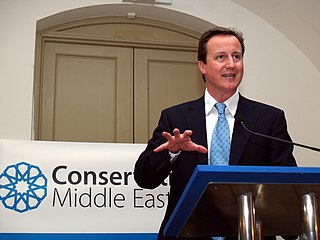
The Conservative Middle East Council or CMEC is an organisation that exists to help ensure that British Conservative MPs and Peers better understand the Middle East. Its director is former MP Charlotte Leslie who was appointed in July 2017.
Kristyan Benedict is crisis response manager for Amnesty International UK (AIUK). His main area of responsibility is Syria.

Palestinian nationalism is the national movement of the Palestinian people that espouses self-determination and sovereignty over the region of Palestine. Originally formed in the early 20th century in opposition to Zionism, Palestinian nationalism later internationalized and attached itself to other ideologies; it has thus rejected the occupation of the Palestinian territories by the government of Israel since the 1967 Six-Day War. Palestinian nationalists often draw upon broader political traditions in their ideology, such as Arab socialism and ethnic nationalism in the context of Muslim religious nationalism. Related beliefs have shaped the government of Palestine and continue to do so.

Syrian–Palestinian relations refers to the official relations between Syria and Palestine. Palestine has an embassy in Damascus, but Syria has no official representative office in Palestine.












